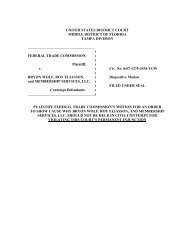Gasoline Price Changes - Federal Trade Commission
Gasoline Price Changes - Federal Trade Commission
Gasoline Price Changes - Federal Trade Commission
Create successful ePaper yourself
Turn your PDF publications into a flip-book with our unique Google optimized e-Paper software.
GASOLINE PRICE CHANGES:<br />
supply. Producers will reduce their production to meet the new, lower level of consumer<br />
demand for gasoline, and will not be inclined to consider any new capacity increases.<br />
C. Together, Consumer and Producer Responses to <strong>Changes</strong> in Market<br />
Conditions Will Produce the New Market Equilibrium <strong>Price</strong>.<br />
<strong>Price</strong>s need to change if current prices no longer will equate the quantity demanded to the<br />
quantity supplied. See Box 1-4: What Happens If <strong>Gasoline</strong> <strong>Price</strong>s Are Not Allowed To Change.<br />
For example, a gasoline supply disruption such as the pipeline break in Phoenix will cause prices<br />
to increase to give consumers an incentive to decrease consumption and producers an incentive<br />
to increase production. In such circumstances, short-run gasoline prices will need to swing<br />
sharply higher to provide those incentives. Consumers do not have very many good substitutes,<br />
and producers usually cannot instantly increase output or transport distant inventories to increase<br />
the quantity supplied to a market. Thus, higher prices are necessary to give consumers and<br />
producers sufficient incentives to change their behavior in the short run.<br />
Over much longer time frames, however, both consumers and producers have more<br />
options to react to the higher prices, so that the long-run price increase will usually be much<br />
smaller than the short-run price increase. For example, following gasoline price hikes in 1979-<br />
1980, U.S. consumers decreased their consumption of gasoline by more than 800,000 bpd – from<br />
7,412,000 bpd in 1978 to 6,539,000 bpd in 1982. See Figure 3-6 infra. Substantially reduced<br />
U.S. gasoline consumption, along with other factors, then drove gas prices down to levels<br />
significantly below the extremely high levels of 1979-80.<br />
Box 1-4: What Happens If <strong>Gasoline</strong> <strong>Price</strong>s Are Not Allowed To Change:<br />
Rationing Is a Costly Solution.<br />
<strong>Gasoline</strong> markets provide a good example of what happens when supply shortfalls are handled through<br />
rationing, rather than allowing prices to change to the new equilibrium price. During the oil crises of<br />
1973-74 and 1979, some states rationed gasoline. For example, drivers with odd-numbered license<br />
plates could buy gasoline only on Monday, Wednesday, and Friday, and drivers with even-numbered<br />
license plates could buy gasoline only on the other days. This type of allocation caused long lines at<br />
gas stations all over the country. The time that consumers spent waiting in line was certainly a cost to<br />
society, as well as problematic for the individuals stuck in those lines. For a full discussion of the<br />
welfare costs of rationing, see H.E. Frech III & William C. Lee, The Welfare Costs of Rationing by<br />
Queuing Across Markets: Theory and Estimates from the U.S. <strong>Gasoline</strong> Crises, 102 Q.J. ECON. 97<br />
(1987).<br />
Moreover, price controls and rationing do not signal producers to bring more supply to the market to<br />
meet increased demand or to offset, at least in part, an interruption in supply. If prices are not allowed<br />
to increase in reaction to a supply reduction, producers have no incentive to provide additional supplies<br />
to alleviate the supply reduction. Shortages are therefore likely to be prolonged. See, e.g., Robert T.<br />
Deacon & Jon Sonstelie, The Welfare Costs of Rationing by Waiting, 27 ECON. INQUIRY 179 (1989).<br />
10<br />
FEDERAL TRADE COMMISSION, JUNE 2005
















